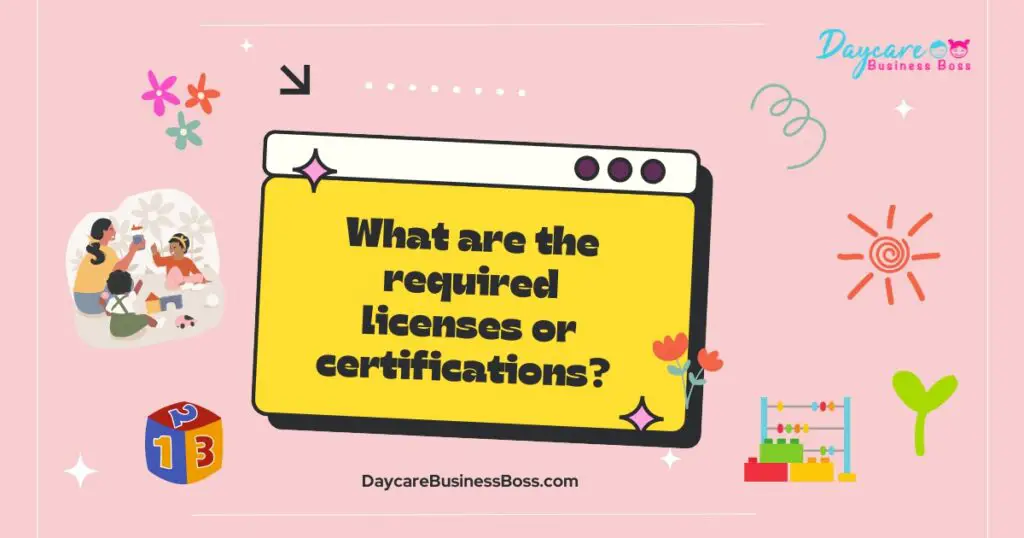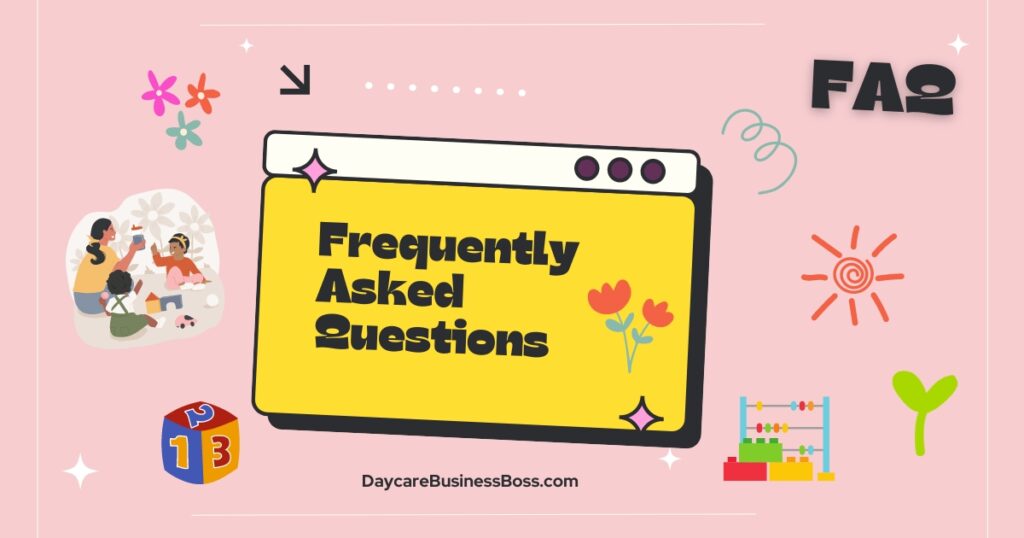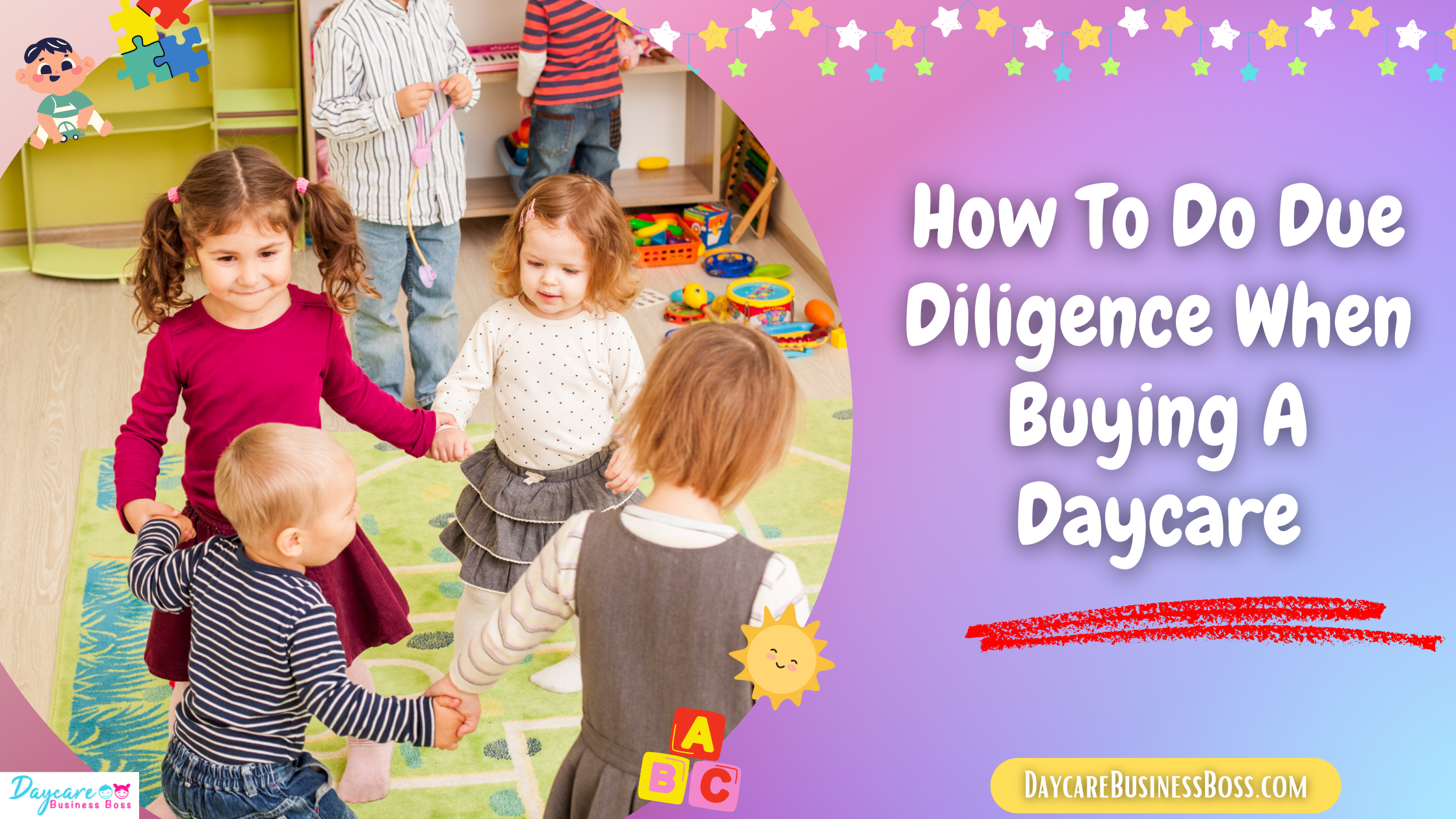You have always had an unmatched love for children and a good eye for business investments. Getting into the child care business would suit you perfectly. Buying a daycare can be a daring and exciting adventure. However, there are many things to consider. Where do you start? What do you do? Which way do you turn? Who can help you? Relax. You can do this.
When purchasing a daycare, it’s going to take a little diligence on your part. Some of the things you will need to know are:
What type of daycare do you want to purchase?
Where is the center located?
What are the required licenses or certifications?
What kind of a down payment will you need?
What kinds of loans or grants are available to daycare owners?
Are there any acquisition fees?
Are the facilities up to standard?
Is the center profitable?
What equipment or supplies will you need to buy?
What are your operating expenses going to be?
What type of daycare do you want to purchase?
You have done your research and you are ready to purchase a daycare. Where do you start? When you are in the market to purchase a daycare, Discovery Point states that you can either buy into a daycare franchise, or you can purchase an active, independent daycare. There are unique benefits available to you, regardless of which path you choose.
Buying into a franchise gives you two options. You can either buy into a previously-existing location, or you can develop a franchise unit from the ground up. per Discovery Point, one of the benefits of buying into a daycare franchise is that the franchise will “provide you with the support and systems of a proven daycare brand.”
Ezine Articles says that buying an existing stand-alone daycare is a viable option to starting one from the ground up because there are fewer costs involved. Many stand-alone daycare centers offer a sense of family that you may not get from a national chain. Chances are, you are going to know your customers and their children. This also applies to some franchises, but it is found more often and single daycare units. They are part of the community. They are your neighbors.
Where is the center located?
We have all heard the saying, “location matters.” While this applies to most businesses, this saying is especially true when it comes to owning a daycare. How big is the town or city in which you want to open your daycare? How many daycares are there in your area? How many schools are located in your area, and how conveniently are they located in your daycare center? These are just a few of the questions you need to ask yourself regarding location when opening a daycare center.
The Center for American Progress aids that rural areas are currently experiencing slow economic growth. They also have higher rates of child poverty, and their children are entering kindergarten behind their peers being raised in metropolitan areas regarding early reading and math skills. This makes access to quality childcare in rural areas a necessity, albeit not a very lucrative one.
Per the Center for American Progress, rural families spend an average of 12% of their income on child care. However, they use regular childcare at rates oddly similar to metropolitan families. There is an ever-growing need for rural daycare centers, as 60%of all rural Americans live in child care deserts.
While there are economic disparities in rural and metropolitan areas, the average income of a rural family is much lower than the average income of a metropolitan family. Multiple websites, like American Progress, state that higher-income families are much more likely to use a licensed daycare than lower-income families. Therefore, if you are considering buying a daycare, choosing one located in a metropolitan area would probably make the most economic sense.
What are the required licenses or certifications?

While there are many types of daycares, they are either licensed or unlicensed. Most unlicensed centers are in-home daycares, with the majority of standalone centers being licensed. However, all daycare centers are required to have a business license to operate.
If you are considering purchasing a daycare center, you should be informed about the different factors involved in child care licensing regulations. Childcare.gov, the topics included in childcare licensing regulations are:
- Child to staff ratio
- Building safety
- Levels of immunization and hygiene implemented
- Childcare program training
- Level of nutrition provided to the children
- Supervision of the children
Child care licensing requirements vary from state to state. The National Database of Child Care Licensing Regulations can educate you on what your state requires. Your state agency can provide you with childcare licensing and inspection records for any daycare you are considering purchasing.
What kind of a down payment will you need?
As with anything you are purchasing on credit, a down payment is usually required. Childcare Brokers states that financial institutions usually require a minimum down payment of 10% of the purchase price. However, a 15% equity down payment is more common. This is applicable if the daycare center you are purchasing includes real estate.
Closing costs and working capital requirements also affect the amount of your down payment. They could increase the amount of your down payment to upwards of 20% of the purchase price. Other aspects can affect the amount of your down payment.
One of those includes the financial particulars of the daycare center. Is the daycare profitable, or does it lose money? If so, how long has it been since the daycare has turned a profit? Your financial statements and credit history also factor greatly in not only the interest rate of your purchase but also the amount of the down payment your bank will require from you.
What kinds of loans or grants are available to daycare owners?
As per School Grants Blog, the NASBE has established the Child Day Care Program, which provides financial assistance in the form of grants to accredited people who want to open a daycare center. If your daycare center is a nonprofit business, there are several sources of federal funding available to you.
For those who seek to open a for-profit daycare, low-interest business loans would be your best option. Boefly states that there are several loans available for prospective daycare owners who intend to purchase an existing business. There are also loans available to those who wish to acquire, improve, or remodel real estate.
Learn more about government grants HERE
The most common form of loan utilized when starting a small business is SBA (Small Business Association) loans. Per Boefly, these loans have lower monthly payments and longer terms. The interest rates on SBA Loans are also generally lower than standard loans, with interest rates offered between 4.25 and 8.75 percent.
Are there any acquisition fees?
According to Fresh Books, the initial startup cost of a daycare ranges from $10,000 to $50,000. Purchasing an existing daycare, or buying into a franchise, can be a lucrative and intriguing prospect. Most franchises require an acquisition fee to buy into their respective franchises. Franchise daycare centers are typically no exception. One option to consider when entering the ever-expanding daycare market is to buy into an existing franchise like KinderCare or Childcare Network.
If you are considering buying into a childcare franchise, Franchises can cost anywhere from $90,000 to over $4,000,000 to start, per How to Start an LLC. This includes all building and hiring costs, which can make buying into a franchise an enticing option. This is because they have done all of the research and work for you. For example, franchise daycare Children’s Lighthouse Learning Center has a franchise fee of $70,000 but has invested a total of $4,511,000 into their daycare franchise.
Franchise Chatter has compiled a list that ranks the top 15 daycare franchises. These franchises are ranked according to average revenue and profit. Purchasing a stand-alone daycare may require a lot of hard work and a lot of money to get it where it needs to be. Typically, franchises have already done most of this for you. However, Franchise Chatter does say that the future of national daycare chains is uncertain at best.
Are the facilities up to standard?
One of the primary concerns with purchasing a daycare operation is whether or not the facility is up to any mandatory codes, rules, and regulations. You may also want to thoroughly check out the physical condition of the building. Is it badly in need of repair? Are those repairs merely cosmetic, or are they more serious?
Is your building structurally sound? Is your building handicap accessible? Does your daycare center meet all codes designated by the Fire Marshall? The Louisiana Office of the Fire Marshall states, amongst many other requirements, that daycare centers “are to be accessible with sloped 1:12 ramps with signage for on-site parking, curb ramps, and toilet rooms following ADA-ABA.” Sprinkler and minimum construction requirements can also be found here.
The Houston Chronicle states that free-standing businesses in most states require that indoor areas provide 35 square feet of space for each child. For outdoor activities, this increases to 75 square feet. Outdoor areas must be enclosed with fencing that is four feet high. You are also required to have at least one toilet and sink for every 15 children, There are other rules which govern the layout of spaces used especially for infants. If your daycare does not meet these standards, there will be expenses associated with potential renovations that could cut into your bottom line.
Is the center profitable?
When purchasing your center, as with any business, the last thing you want to do is to lose money. Daycare Business Boss states that the average daycare located in the United States profits an average of $37,000 annually. Some owners reported earnings above $60,000 while others reported less than $20,000 in earnings.
Here are a few figures from Boefly that illustrate the growth and value of daycares in America:
- From 2015-20202, the daycare’s have experienced 2.4 % average industry growth.
- 23.4% of children under 5 years old are enrolled in some form of child care.
- In 2019, families spent an average of 7.8% of their household income on child care.
What are a few things which factor into determining whether or not a daycare center is profitable? Daycare Business Boss cites the type of the daycare as well as its location as two of the biggest factors. With fewer overhead expenses, smaller operating cost, and fewer staff requirements,
in-home daycare centers generally make more money than standalone centers. Therefore, opening a standalone daycare center is going to be less profitable than running a daycare out of your home. Also, rural daycare centers make much less money than daycares in areas with a denser population. Per Daycare Business Boss, contributing factors include:
- Fewer children available to attend due to fewer schools
- Increased advertising and marketing costs
- The increased cost of getting new customers due to less word-of-mouth advertising
Of course, there are going to be initial expenses involved with any investments or business acquisitions. However, there may be the temptation to invest in a daycare that is less than profitable, thinking that you can “turn things around.” You may want to resist that urge.
Childcare Brokers advises against daycare centers that have either lost money or have not made a profit for the last two years. A new daycare center will generally take approximately one year to build. During this time, your daycare will be losing money, per Childcare Brokers. Established daycare centers should be breaking even, at the very least. After all, even if they are breaking even, they are not making any money.
What equipment or supplies will you need to buy?
There are bound to be some costs associated with purchasing a daycare. More than a few of these costs are going to be associated with equipment and supplies costs. Will you need to purchase new equipment to replace outdated or broken equipment? Are there a few things that you feel will put your center over the top by purchasing? What kind of supplies will you need?
Child Fun has provided ab extensive list of equipment your daycare center should own to provide the best possible experience for your students. Their recommendation includes, but is not limited to:
- Child-size recliners
- Coat racks
- Toddler rockers with washable covers
- Paintbrushes
- Infant bouncers
- Microwaves, an oven, and at least one sink
- Baby Bouncer
- Large felt boards
- Desks and chairs
- Nap mats
- Activity tables
- Playpens
- Outdoor play structures
- Playhouses
- Red boppies
- Legos
- Riding objects like tricycles
- Safety gate
- Safety mirror
- Sand & water table (with lid)
- Sandbox (with lid)
- Swing sets
- Teepee tents
- Toddler slide
- Toolbox
- Workshop
- Activity rugs
Other equipment and supplies may include:
- Televisions and DVD players
- Computers, software, and peripherals
- Diapers and wipes
- Cleaning equipment
- Cleaning supplies
- Office supplies
Per Child Fun, the total cost of equipment and supplies needed can range from $1,500 to “5,000. Many factors can contribute to the amount your center will have to spend on equipment and supplies, however. Three of those factors are: the number of children enrolled in your daycare, the quality of the equipment and supplies you purchase, and the quantity of equipment and supplies your daycare needs.
What are your operating expenses going to be?
Operating expenses have a direct impact on your daycare’s profit. There are many operating expenses associated with owning a daycare. Some of those expenses include payroll, newsflash) meals and supplies advertising and marketing, rent or mortgage, insurance, rental and property taxes, and maintenance expenses. To provide the safest experience possible for you, your staff, your students, and their parents, you will also need to purchase or lease a security system. So, how much are these expenses going to cost?
Forbes said that for a daycare able to accommodate your state’s mandated staff-to-child ratios, salaries will be around 70% of your total operating expenses. Meals and supplies are around 4% of your operating budget. They also state that rent and property taxes consume around 15%. insurance and maintenance add up to around 2% of your budget. Your rent or mortgage has several variables to offer an accurate estimation of its effect on your operating costs, like location, credit score, and the amount of your down payment. Of course, these figures are not set in stone. There are bound to be minor fluctuations in your operating expenses. For instance, you may need to hire another staff member. You may also need to purchase more supplies or equipment that weren’t accounted for initially.
You have done your due diligence by researching the most commonly asked questions in opening a daycare center. Knowing what kind of daycare center you want to purchase and all of the particulars involved is the hardest step. Now, it’s time to go purchase that stand-alone daycare or invest in that daycare franchise you have been wanting.
Related Questions

What kind of insurance do you need for a licensed daycare facility?
The Balance SMB says that insurance requirements are regulated on a state-by-state basis. However, they strongly advise purchasing liability insurance. If you have an in-home daycare center, your homeowner’s insurance will not cover any incidents, accidents, injuries, or liabilities associated with a daycare business.
What do parents look for in a daycare?
The blog EZ Child Track states that when looking for a potential daycare center for their children, 82% of parents use referrals and recommendations from other parents. However, they also look at the daycare’s environment, and how their children react to and in that environment. You can offer a tour or set up a playdate for potential students if their parents want to see how they react in your environment.
Is the daycare business a good investment?
Small Business Trends says that daycare centers are always in and this need increases almost every year. Daycare centers in America brought in over 57 million dollars in 2019. If you have a great small business plan. You can grow your daycare to be a profitable investment in your future and the future of your students.
Please note: This blog post is for educational purposes only and does not constitute legal advice. Please consult a legal expert to address your specific needs.
To learn more on how to start your own daycare checkout my startup course and documents here.

Meet Shawn Chun: Entrepreneur and Childcare Business Fan.
I’m a happy individual who happens to be an entrepreneur. I have owned several types of businesses in my life from a coffee shop to an import and export business to an online review business plus a few more and now I create online daycare business resources for those interested in starting new ventures. It’s demanding work but I love it. I do it for those passionate about their business and their goals. That’s why when I meet a childcare business owner, I see myself. I know how hard the struggle is to retain clients, find good employees and keep the business growing all while trying to stay competitive.
That’s why I created Daycare Business Boss: I want to help childcare business owners like you build a thriving business that brings you endless joy and supports your ideal lifestyle.

